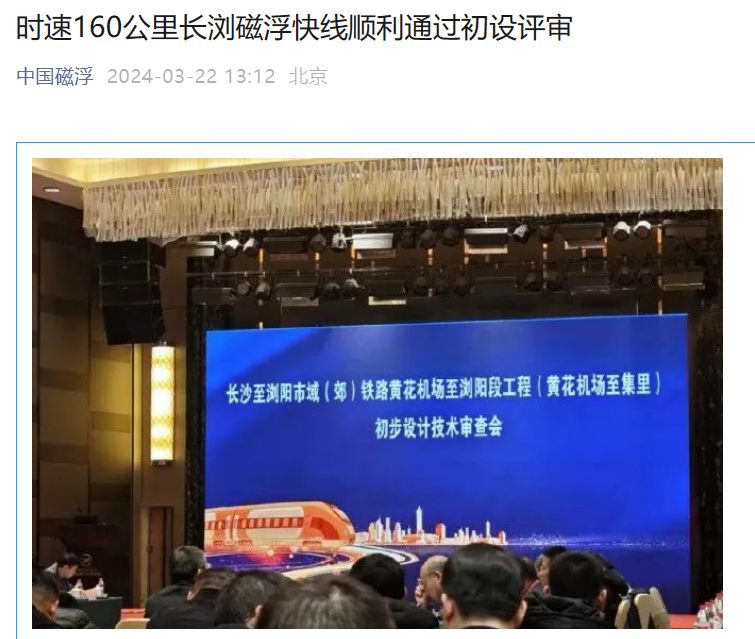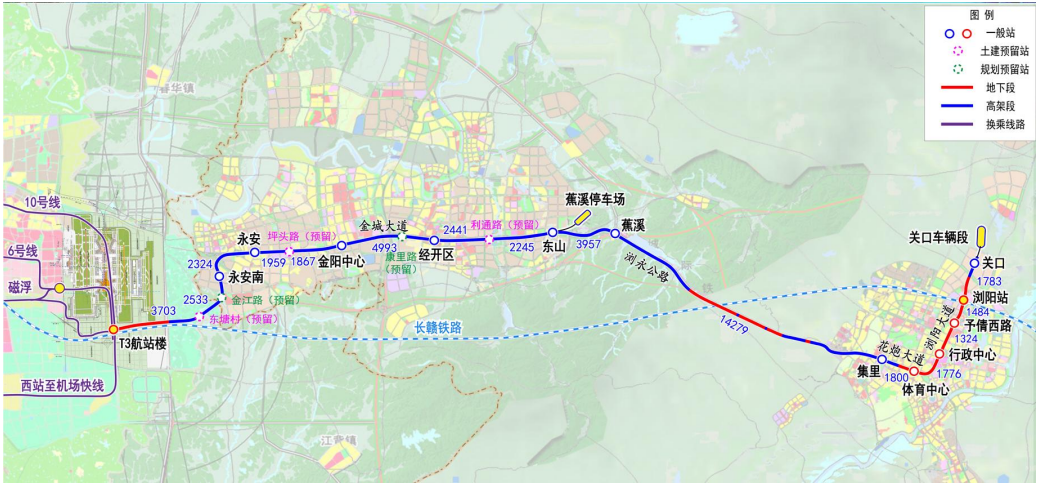 Technology peripherals
Technology peripherals
 It Industry
It Industry
 The 160 kilometers per hour Changsha to Liuyang maglev express line has successfully passed the preliminary design review and is scheduled to start construction in the first half of the year
The 160 kilometers per hour Changsha to Liuyang maglev express line has successfully passed the preliminary design review and is scheduled to start construction in the first half of the year
The 160 kilometers per hour Changsha to Liuyang maglev express line has successfully passed the preliminary design review and is scheduled to start construction in the first half of the year
News from this site on March 22, according to the China Urban Public Transport Association Maglev Transportation Branch, recently, the preliminary design of the Huanghua Airport to Liuyang section of the Changsha-Liuyang City (Suburban) Railway passed expert review, will adopt rapid Maglev transportation system, with a design speed of 160 kilometers per hour.

The project is planned to start construction in the first half of the year. After completion, it will effectively shorten the time and space distance between Changsha urban area, Ningxiang and Liuyang. In order to promote Play an active role in coordinated regional development.
According to reports, the project adopts a rapid maglev transportation system with a design speed of 160 kilometers per hour. It is the first of its kind in the field of urban (suburban) railways. It is also the first of its kind in the design speed of medium and low-speed maglev systems. A major breakthrough in various fields such as , project scale and so on.
As an important infrastructure for the integrated construction of the Changsha-Zhuzhou-Tan area, the Changliu Line connects Changsha City, Huanghua International Airport, Yongan, Jinyang New City Group and Liuyang City Sub-center and other passenger flow distribution points.It is an important support for expanding Changsha's urban space, building an urban development pattern of "one body, two wings, two axes and two belts" and realizing Liuyang's westward development. According to inquiries on this website, the project starts from Huanghua Airport T3 Terminal Station, is mainly laid along Xinhe South Road, Jincheng Avenue, Liuyong Highway, Huapao Avenue and Liuyang Avenue, and ends at Liuyang Pass Station.
The total length of the line is 48.73 kilometers, with 15 stations. The entire line is mainly laid on elevated lines, including 11 elevated stations (including 3 reserved stations for civil construction) and 4 underground stations.

The above is the detailed content of The 160 kilometers per hour Changsha to Liuyang maglev express line has successfully passed the preliminary design review and is scheduled to start construction in the first half of the year. For more information, please follow other related articles on the PHP Chinese website!

Hot AI Tools

Undresser.AI Undress
AI-powered app for creating realistic nude photos

AI Clothes Remover
Online AI tool for removing clothes from photos.

Undress AI Tool
Undress images for free

Clothoff.io
AI clothes remover

Video Face Swap
Swap faces in any video effortlessly with our completely free AI face swap tool!

Hot Article

Hot Tools

Notepad++7.3.1
Easy-to-use and free code editor

SublimeText3 Chinese version
Chinese version, very easy to use

Zend Studio 13.0.1
Powerful PHP integrated development environment

Dreamweaver CS6
Visual web development tools

SublimeText3 Mac version
God-level code editing software (SublimeText3)

Hot Topics
 1387
1387
 52
52
 Top 10 Best Free Backlink Checker Tools in 2025
Mar 21, 2025 am 08:28 AM
Top 10 Best Free Backlink Checker Tools in 2025
Mar 21, 2025 am 08:28 AM
Website construction is just the first step: the importance of SEO and backlinks Building a website is just the first step to converting it into a valuable marketing asset. You need to do SEO optimization to improve the visibility of your website in search engines and attract potential customers. Backlinks are the key to improving your website rankings, and it shows Google and other search engines the authority and credibility of your website. Not all backlinks are beneficial: Identify and avoid harmful links Not all backlinks are beneficial. Harmful links can harm your ranking. Excellent free backlink checking tool monitors the source of links to your website and reminds you of harmful links. In addition, you can also analyze your competitors’ link strategies and learn from them. Free backlink checking tool: Your SEO intelligence officer
 Building a Network Vulnerability Scanner with Go
Apr 01, 2025 am 08:27 AM
Building a Network Vulnerability Scanner with Go
Apr 01, 2025 am 08:27 AM
This Go-based network vulnerability scanner efficiently identifies potential security weaknesses. It leverages Go's concurrency features for speed and includes service detection and vulnerability matching. Let's explore its capabilities and ethical
 CNCF Arm64 Pilot: Impact and Insights
Apr 15, 2025 am 08:27 AM
CNCF Arm64 Pilot: Impact and Insights
Apr 15, 2025 am 08:27 AM
This pilot program, a collaboration between the CNCF (Cloud Native Computing Foundation), Ampere Computing, Equinix Metal, and Actuated, streamlines arm64 CI/CD for CNCF GitHub projects. The initiative addresses security concerns and performance lim
 Serverless Image Processing Pipeline with AWS ECS and Lambda
Apr 18, 2025 am 08:28 AM
Serverless Image Processing Pipeline with AWS ECS and Lambda
Apr 18, 2025 am 08:28 AM
This tutorial guides you through building a serverless image processing pipeline using AWS services. We'll create a Next.js frontend deployed on an ECS Fargate cluster, interacting with an API Gateway, Lambda functions, S3 buckets, and DynamoDB. Th



